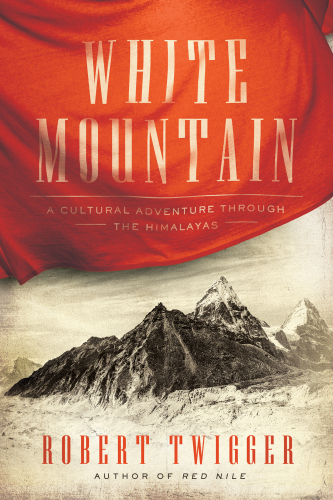
White Mountain
- اطلاعات
- نقد و بررسی
- دیدگاه کاربران
نقد و بررسی

August 7, 2017
On a quest to understand the geographic and cultural significance of the Himalayas, British author and adventurer Twigger (Red Nile) weaves the stories of mountaineers and mystics, Buddhists and biologists, with an account of his own trek across the legendary mountain range. Slim chapters on early 20th-century figures with connections to the region, including George Everest and Greco-Armenian spiritualist G.I. Gurdjieff, are held together by musings on philosophy, history, and science, as well as a healthy dash of condescension for anyone who doesn’t resemble Twigger himself—white, male, Oxbridge educated, and infatuated with wordy banalities such as “the unreachable is also a way of conceptualizing the absolute.” Baggy and disorganized, the book is difficult to follow, and the dramatic impact of Twigger’s own ascent is undercut by the lack of evocative or detailed descriptions of the people and places he encounters. As its title unintentionally reveals, this is a book that serves to reenact Western fantasies about conquering a rugged and “timeless” East. Yet Twigger is not above pandering to modern audiences, with cringeworthy chapter openings such as “Shamans get high. Go higher.” The result is a singularly bizarre volume that manages to be far too long while not saying anything much.

Starred review from August 1, 2017
The story should have been simple: author (Red Nile; Angry White Pyjamas) and adventurer Twigger decides to travel along the Himalayas looking for what makes these mountains in Asia so special or magical. But as one finds with the best travel writers, some questions are not easily answered. While mainly in India, Twigger tries to understand the Himalayas from their history, geography, religions, myths, and people--those living and historical (from Alexandra David-Neel and Francis Younghusband to Edmund Hillary and His Holiness the Dalai Lama) that seem to haunt this landscape playing their Great Game or trying to climb a mountain. Yet readers also find stories of missing nuclear batteries, yetis, and the author's own search for his family history, all of which makes for a wonderful voyage. VERDICT This is an enchanting book that readers will not be able to put down, and when they are finished they will ask why it wasn't longer. Will be of great interest to those looking for books on travel, history, and culture of the Himalayas, India, and the region. Highly recommended.--Melissa Aho, Univ. of Minnesota Bio-Medical Lib., Minneapolis
Copyright 2017 Library Journal, LLC Used with permission.

August 1, 2017
The story should have been simple: author (Red Nile; Angry White Pyjamas) and adventurer Twigger decides to travel along the Himalayas looking for what makes these mountains in Asia so special or magical. But as one finds with the best travel writers, some questions are not easily answered. While mainly in India, Twigger tries to understand the Himalayas from their history, geography, religions, myths, and people--those living and historical (from Alexandra David-Neel and Francis Younghusband to Edmund Hillary and His Holiness the Dalai Lama) that seem to haunt this landscape playing their Great Game or trying to climb a mountain. Yet readers also find stories of missing nuclear batteries, yetis, and the author's own search for his family history, all of which makes for a wonderful voyage. VERDICT This is an enchanting book that readers will not be able to put down, and when they are finished they will ask why it wasn't longer. Will be of great interest to those looking for books on travel, history, and culture of the Himalayas, India, and the region. Highly recommended.--Melissa Aho, Univ. of Minnesota Bio-Medical Lib., Minneapolis
Copyright 2017 Library Journal, LLC Used with permission.

August 15, 2017
A trip to discover the "spirit and soma" of the formidable peaks.Poet and award-winning writer Twigger (Red Nile: A Biography of the World's Greatest River, 2014, etc.) takes on the mighty Himalayas in a sprawling, panoramic chronicle of history and adventure. Drawing on mountaineers' memoirs, histories, and his own experiences, the author offers quirky facts, idiosyncratic observations, and vivid profiles of some of the most daring climbers. Twigger explains the biology of altitude sickness, caused by the body's efforts "to re-establish the same levels of oxygen in each cell as would be experienced at sea level." Besides nausea, headache, and dizziness, breathing at a high altitude causes a mental state similar to intoxication, attracting seekers of spiritual enlightenment. In thin air, he was told, they "have to listen to their breath. This reminds them that they are human after all. And they mistake this insight for something wonderful." Twigger investigates the many religious groups prevalent in the mountains: "Hindus, Muslims, Bon worshippers, Lepchas, Mishmis and Christians." But Buddhism is "the central Himalayan religion." He also steeps himself in prevalent superstitions, including the power of curses and the elusive Yeti. "Imaginary creatures," he reflects, "transform a banal journey into an exciting one." From his recounting of mountaineering expeditions, it's clear that there is nothing banal about climbing in the Himalayas. Twigger is at his liveliest following the treks and travails of climbers such as Col. Francis Younghusband, an intrepid Englishman who crossed the challenging Mustagh Pass in 1887; his compatriot Aleister Crowley ("corpulent heroin addict and alcoholic"), who, in 1904 made a climb using the newly invented crampons; George Curzon, a fascist sympathizer; and author Jon Krakauer, a client (i.e., paying) climber, whose record of an Everest expedition was made into a movie. Twigger peppers the book with digressions and philosophical musings--on the nature of reality, the power of gurus, mapping, and other topics. "To map is to be," he writes. "The map-maker seeks to control the world through recreating it in an abstract form." A colorful, entertaining journey with a voluble guide.
COPYRIGHT(2017) Kirkus Reviews, ALL RIGHTS RESERVED.




دیدگاه کاربران